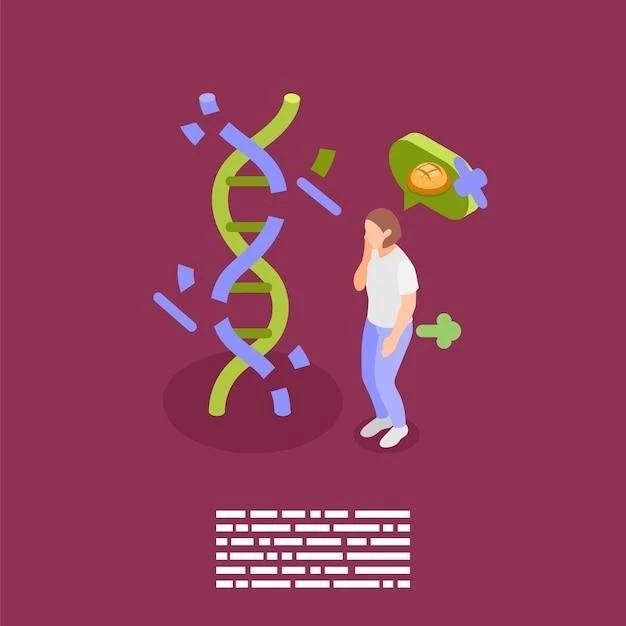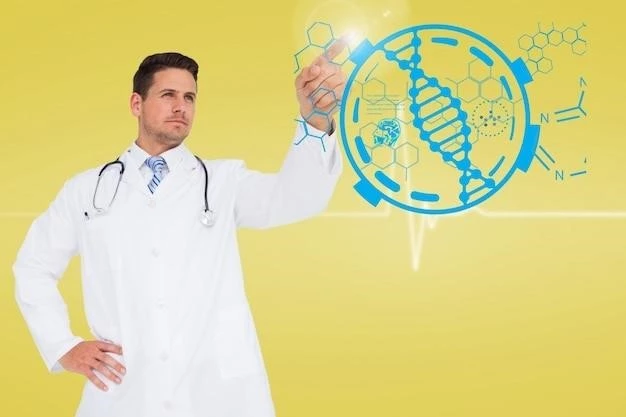Understanding Chromosome 13 Disorders is crucial for better managing symptoms and seeking appropriate treatments.
When exploring the Overview of Chromosome 13 Abnormalities٫ it’s essential to understand the genetic variations that can impact individuals’ health. Chromosome 13 disorders٫ such as monosomy 13q٫ involve missing genetic material on the long arm of chromosome 13. This deletion can lead to various physical and developmental challenges. By familiarizing yourself with the specific characteristics of these abnormalities٫ you can better comprehend the complexity of these genetic conditions and the potential impact on individuals. Seek guidance from medical professionals and genetic counselors to gain a deeper understanding of how chromosome 13 abnormalities may affect you or your loved ones.
Recognizing the Symptoms of Monosomy 13q is crucial for early intervention and effective management.
When it comes to the Physical Symptoms of Monosomy 13q, individuals may experience a range of challenges affecting various body systems. These can include craniofacial abnormalities, heart defects, intellectual disability, and growth delays. It is essential to monitor these symptoms closely and consult healthcare providers for appropriate assessments and interventions. By staying informed about potential physical manifestations of monosomy 13q, families can work together with medical professionals to address these issues proactively and provide the best possible care and support for individuals with this chromosomal abnormality.
Understanding the Developmental Challenges associated with monosomy 13q is essential for providing appropriate support and interventions. Individuals with this chromosomal abnormality may face delays in motor skills٫ speech and language development٫ cognitive abilities٫ and social interactions. By being aware of these potential challenges٫ families and caregivers can seek early interventions such as developmental therapies and educational support to help individuals reach their full potential. It’s important to work closely with healthcare professionals to create tailored intervention plans that address the specific developmental needs of those affected by monosomy 13q.
Exploring effective Treatment Options for Chromosome 13 Disorders is key to managing symptoms and improving quality of life.
When considering Medical Interventions for Chromosome 13 Disorders, it is essential to collaborate with healthcare professionals to design a comprehensive care plan tailored to the individual’s needs. Medical interventions may include treatments for specific symptoms like heart defects, surgeries for craniofacial abnormalities, and therapies to address developmental delays. By staying informed about available medical options and working closely with specialists, families can ensure that individuals with chromosome 13 disorders receive optimal medical care to manage their conditions effectively and enhance their overall well-being.
Exploring Therapeutic Approaches for Chromosome 13 Disorders involves incorporating various therapies to address both physical and developmental challenges. These approaches may include occupational therapy, speech therapy, physical therapy, and special education services tailored to individual needs. By integrating a combination of therapeutic interventions, individuals with chromosome 13 disorders can enhance their functional abilities, communication skills, and overall quality of life. Working closely with a multidisciplinary team of therapists and educators can help optimize therapeutic outcomes and provide comprehensive care for individuals with these genetic conditions.
Accessing Genetic Counseling for Monosomy 13q is vital for understanding genetic implications and family planning decisions.
Role of Genetic Counselors
Genetic counselors play a crucial Role in providing information, support, and guidance to individuals and families affected by chromosome 13 disorders. They help interpret genetic testing results, explain the implications of genetic conditions, and assist in making informed decisions regarding healthcare and family planning. By working with genetic counselors, individuals can better understand the genetic aspects of monosomy 13q, explore available resources, and receive personalized support tailored to their unique needs. Genetic counselors serve as valuable allies in navigating the complexities of genetic conditions and empowering individuals to make informed choices for themselves and their families.
Family Planning Considerations
When facing Family Planning Considerations related to chromosome 13 disorders, it is essential to consult with genetic counselors to assess the risks and understand the genetic implications for future generations. Individuals carrying chromosomal abnormalities may need specialized reproductive counseling to make informed decisions about family planning options, including prenatal testing, preimplantation genetic diagnosis, and adoption. By discussing family planning considerations with healthcare providers and genetic counselors, individuals can navigate the complexities of genetic conditions and explore choices that align with their values and aspirations for building a family.
Staying informed about Research Updates on Chromosome 13 Abnormalities is crucial for understanding advancements in treatment.
Recent Discoveries
Recent Discoveries in the realm of Chromosome 13 Abnormalities have paved the way for new insights into the genetic mechanisms underlying these conditions. From identifying potential biomarkers to exploring innovative treatment approaches, ongoing research initiatives continue to shape the landscape of chromosome 13 disorders. By staying updated on the latest discoveries, individuals, families, and healthcare providers can collaborate to explore novel therapeutic interventions and enhance the quality of care for individuals affected by these genetic abnormalities. Embracing these discoveries can offer hope and open new possibilities for improved outcomes and well-being.
Potential Future Treatments
Exploring Potential Future Treatments for Chromosome 13 Abnormalities offers a glimpse into promising avenues of research that may lead to breakthrough therapies in the future. From gene therapies to precision medicine approaches, the evolving landscape of biomedical research holds potential for novel treatments tailored to address the specific genetic factors underlying chromosome 13 disorders. By following developments in potential future treatments, individuals and families can stay informed about emerging options and contribute to shaping the future of care for those affected by these genetic conditions. Collaborating with healthcare professionals and researchers can help pave the way for innovative treatment modalities that improve outcomes and quality of life.

Coping Strategies for Families Affected by Chromosome 13 Deletions
Implementing Coping Strategies can help families navigate the challenges of Chromosome 13 Deletions with resilience and support.
Support Networks
Engaging with Support Networks can provide families affected by Chromosome 13 Deletions with valuable connections٫ understanding٫ and shared experiences. Joining support groups٫ online forums٫ and seeking community resources can offer emotional comfort٫ information٫ and a sense of belonging. By connecting with others facing similar challenges٫ families can exchange knowledge٫ access peer support٫ and build a strong network of individuals who truly understand their journey. Support networks create a safe space for sharing concerns٫ celebrating victories٫ and fostering resilience in navigating the complexities of chromosome 13 disorders. Remember٫ you are not alone on this path.
Emotional Well-being
Prioritizing Emotional Well-being is essential for families affected by Chromosome 13 Disorders, as coping with genetic conditions can be emotionally challenging. It’s crucial to acknowledge and address feelings of stress, anxiety, and grief that may arise. Practicing self-care, seeking counseling or therapy, and maintaining open communication within the family can support emotional well-being. Remember that it’s okay to seek help and take breaks when needed. By nurturing emotional health, families can cultivate resilience, foster positive coping strategies, and strengthen their ability to navigate the complexities of chromosome 13 disorders with courage and compassion.
Early Detection of Monosomy 13q
Early Detection is key for timely interventions and comprehensive management of Monosomy 13q.
Diagnostic Tests
Undergoing Diagnostic Tests plays a crucial role in identifying Monosomy 13q at an early stage. Genetic tests, imaging studies, and clinical evaluations are commonly used to diagnose chromosome 13 abnormalities. Timely and accurate diagnosis enables healthcare providers to develop personalized treatment plans and provide appropriate support to individuals and families affected by Monosomy 13q. It is important to work closely with medical professionals and genetic specialists to understand the diagnostic process, interpret test results, and make informed decisions regarding care and management strategies. Early detection through diagnostic testing empowers families to access resources and interventions that can positively impact outcomes.
Importance of Early Intervention
The Importance of Early Intervention in Monosomy 13q cannot be overstated as it can significantly impact outcomes. Early identification and initiation of targeted interventions such as therapies, educational support, and medical treatments can help address developmental delays, manage symptoms, and improve overall quality of life. By intervening early, individuals with chromosome 13 disorders have the opportunity to reach their full potential and enhance their well-being. Collaborating with a multidisciplinary healthcare team and starting interventions promptly can make a meaningful difference in the long-term prognosis and success of managing Monosomy 13q. Remember, early intervention paves the way for better outcomes and improved quality of life.
Lifestyle Recommendations for Individuals with Chromosome 13 Abnormalities
Implementing healthy habits and adaptive strategies can enhance quality of life for those with chromosome 13 abnormalities.
Healthy Habits
Cultivating Healthy Habits is essential for individuals with Chromosome 13 Abnormalities to support overall well-being. Encouraging a balanced diet٫ regular physical activity٫ sufficient sleep٫ and hydration can promote optimal health. Additionally٫ staying connected with healthcare providers for routine check-ups and monitoring can help manage any associated health concerns effectively. By prioritizing healthy habits٫ individuals with chromosome 13 abnormalities can enhance their physical and mental well-being٫ improve energy levels٫ and strengthen their resilience in coping with the challenges of their condition.
Adaptive Strategies
Developing Adaptive Strategies can empower individuals with Chromosome 13 Abnormalities to navigate challenges and optimize their daily routines. These strategies may include creating structured schedules٫ utilizing assistive technologies٫ and implementing personalized coping mechanisms to enhance independence and functional abilities. By identifying and implementing adaptive strategies tailored to individual needs٫ individuals with chromosome 13 abnormalities can improve their ability to manage tasks٫ communicate effectively٫ and participate in various activities. Working with healthcare professionals and occupational therapists can help individuals maximize their strengths٫ address limitations٫ and lead fulfilling lives despite the challenges posed by their condition.
